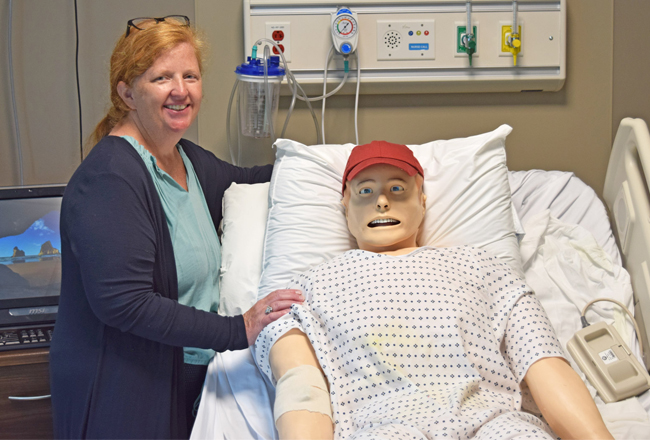Fairfield University nursing students learn their profession with help of newly trained actors
While most actors aspire for a chance to display their dramatic skills on the stage, the screen or television, a new cohort of actors is being gathered to channel their inner Olivier in an unlikely environment: Fairfield University”™s Egan School of Nursing.
From Sept. 17-19, the school is hosting a workshop called “Patients and Performance: Healthcare Method Acting,” which trains nonprofessional members of the community to play the roles of hospital patients seeking health care.
These newly minted actors will find themselves in scenes with Fairfield University nursing students who are learning how to interact with patients in a multitude of challenging situations.

According to Susan Reynolds, the school”™s director of simulation, the neophyte actors are trained by both a theater acting teacher and a nurse practitioner on how they should present their specific “illnesses.”
“They teach people to be actors and portray a patient,” she said. “For example, with mental health they”™ll learn how to portray schizophrenia or bipolar disease, so that students can get that true feeling of being with a patient.”
While in concept one might imagine it would be easier to work with professional actors rather than train nonprofessionals for the task, Reynolds emphasized that nonprofessionals come to this assignment with less inhibitions and more focus.
“It”™s about the student ”” it”™s not about the acting,” she continued. “I think actors sometimes have trouble making that switchover that it”™s not about their performance. It”™s really about the student giving them a chance to practice their communication skills, whether it”™s de-escalating a patient who”™s upset or giving them bad news or providing empathy.”
During the interaction between actors and students, a faculty member is present as a content expert to judge how the scenarios unfold. Interactions are videotaped for reference purposes, but Reynolds noted these recordings are not preserved for long-term storage.
In some scenarios where the role-playing between student and actor requires an in-depth examination that could veer into a potentially uncomfortable situation for the actor, the exercise becomes a hybrid situation where an actor recreates the symptoms in need of examination but a nursing school mannequin called a “test trainer” is used for the more hands-on aspect of the situation.
“The actors need to be able to be comfortable having a student listen to their lungs and their heart and do a regular exam, but it doesn”™t have to be completely invasive,” she said.
Fairfield University has been doing iterations of this workshop since 2016, although last year”™s brought in a new angle as pandemic protocols put the actors on Zoom while encouraging the students to have a greater understanding of patient care and diagnoses via telehealth platforms.
This year”™s workshop is free and open to the public. In exchange for completing the free three-day workshop, participants are asked to commit to 10 unpaid hours of standardized patient acting. After fulfilling the 10-hour commitment, simulation actors are eligible to earn $18 per hour for additional acting chores.
As for the nursing students, Reynolds stated that interacting with the actors has been beneficial for their education.
“They usually learn a ton from it,” she said. “Sometimes they”™re very, very nervous because they know they”™re being watched, and some of them just forget about that and take care of their patient.”